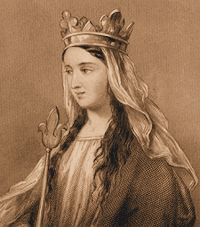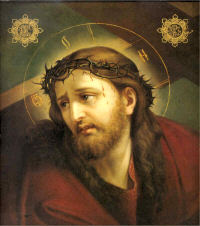Lent: March 14th
Saturday of the Second Week of Lent
Other Commemorations: St. Matilda (RM)
» Enjoy our Liturgical Seasons series of e-books!
Sometimes it is hard for the human mind to grasp the ways of God. The Church knows this and wants us to know that God does not judge according to our restricted mental outlook. God has his own standard for judgment and it is very different form ours. He has told us that his ways are not our ways. It is for us to adjust our standards to God's.
Meditation: One Is Your Father
One is your Father, who is in heaven; one is your teacher, Christ; you are all brothers!
In these words lies embedded the basic structure of Christian common life. The Christian ideal, life with the Church, is emphasized.
- First, the Fatherhood of God. God is the head of the family. For the early Christians it was a new and thrilling experience to be able to address God as Abba, Father. Down to the present time this approach to God is peculiarly Christian. There is here no juridical balance between accomplishment and merit, but a predominance of grace and love. Perhaps we have grown too accustomed to this unique privilege to be duly impressed. God is our Father, we His children. To be a child of God is to have high rank through grace; this is our nobility. Lent should deepen this Father-child relationship, should increase our confidence in God's fatherly goodness and care, should deepen our spirit of obedience and childlike reverence.
- Christ is our teacher and master. We are called Christians, but do we always act so as to deserve the name? Do we give constant attention to maintaining our Christian dignity? Are we humble enough to learn from Christ, as willing pupils? His message comes to us most clearly in the Gospel. A good student would never tire of examining the Gospel and following in his master's footsteps. Christ speaks to us also through His priests, in the Church. Let us hold fast His doctrine, and esteem His commands, especially His principal commandment, love. No longer I, but Christ lives in me!
- We are all brothers! We are God's great family, bound by a strong, common bond. Community is the word we have rediscovered-community in prayer, in sacrifice, in common action. We must make this truth operative in every group of which we are part, e.g., family, business, factory, parish, state! But what special significance this truth assumes at divine services, at holy Mass! There we are grouped around our teacher, Christ. We are His members, and He leads us to the Father. Yes, in the Sacrifice of the Mass all three are together: Father, teacher, and brothers.

The Station is in the church of Sts. Peter and Marcellinus, two celebrated martyrs of Rome under the persecution of Diocletian. Their relics were brought to the church in 1256, and the church was restored the same year on order from Pope Alexander IV.
St. Matilda (also known as "Maud" or "Maude")
 This princess was daughter of Theodoric, a powerful Saxon count. Her parents placed her very young in the monastery of Erford, of which her grandmother Maud was then abbess. Our Saint remained in that house, an accomplished model of all virtues, till her parents married her to Henry, son of Otho, Duke of Saxony, in 913, who was afterwards chosen king of Germany. He was a pious and victorious prince, and very tender of his subjects.
This princess was daughter of Theodoric, a powerful Saxon count. Her parents placed her very young in the monastery of Erford, of which her grandmother Maud was then abbess. Our Saint remained in that house, an accomplished model of all virtues, till her parents married her to Henry, son of Otho, Duke of Saxony, in 913, who was afterwards chosen king of Germany. He was a pious and victorious prince, and very tender of his subjects.
Whilst by his arms he checked the insolence of the Hungarians and Danes, and enlarged his dominions by adding to them Bavaria, Maud gained domestic victories over her spiritual enemies more worthy of a Christian and far greater in the eyes of Heaven. She nourished the precious seeds of devotion and humility in her heart by assiduous prayer and meditation. It was her delight to visit, comfort, and exhort the sick and the afflicted; to serve and instruct the poor, and to afford her charitable succor to prisoners. Her husband, edified by her example, concurred with her in every pious undertaking which she projected.
After twenty-three years' marriage God was pleased to call the king to himself, in 936. Maud, during his sickness, went to the church to pour forth her soul in prayer for him at the foot of the altar. As soon as she understood, by the tears and cries of the people, that he had expired, she called for a priest that was fasting to offer the holy sacrifice for his soul.
She had three sons: Otho, afterwards emperor; Henry, Duke of Bavaria; and St. Brunn, Archbishop of Cologne. Otho was crowned king of Germany in 937, and emperor at Rome in 962, after his victories over the Bohemians and Lombards.
The two oldest sons conspired to strip Maud of her dowry, on the unjust pretence that she had squandered the revenues of the state on the poor. The unnatural princes at length repented of their injustice, and restored to her all that had been taken from her.
She then became more liberal in her alms than ever, and founded many churches, with five monasteries.
In her last sickness she made her confession to her grandson William, the Archbishop of Mentz, who yet died twelve days before her, on his road home. She again made a public confession before the priests and monks of the place, received a second time the last sacraments, and, lying on a sack-cloth, with ashes on her head, died on the 14th of March in 968.
—Excerpted from Lives of the Saints, by Alban Butler, Benziger Bros. ed. [1894]
Patronage: death of children; disappointing children; falsely accused people; large families; people ridiculed for their piety; queens; second marriages; widows
Symbols and Representation: alms; bag of money; crown; orb; scepter; purse, indicative of her generosity; queen with a whip; queen holding a church
Highlights and Things to Do:
- Read more about St. Matilda:
- Read Spotlight on Queen Mathilda of Saxony.
- St. Mathilda's remains are in Quedlinburg Abbey next to her husband. The church is now used by the Lutheran Evangelical Church in Germany






